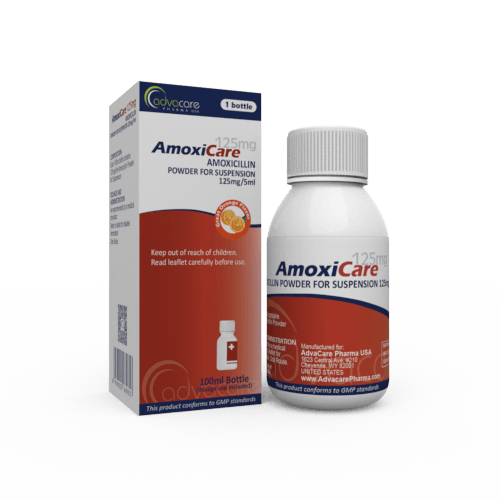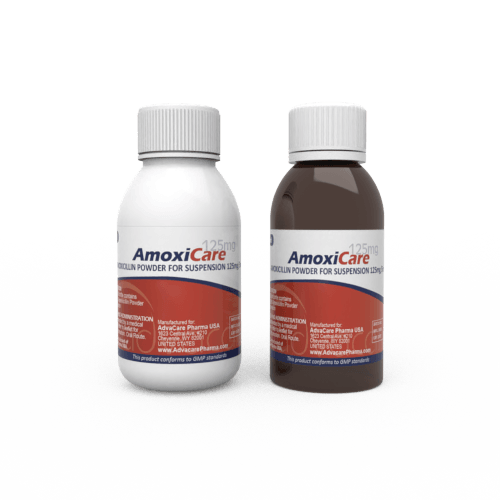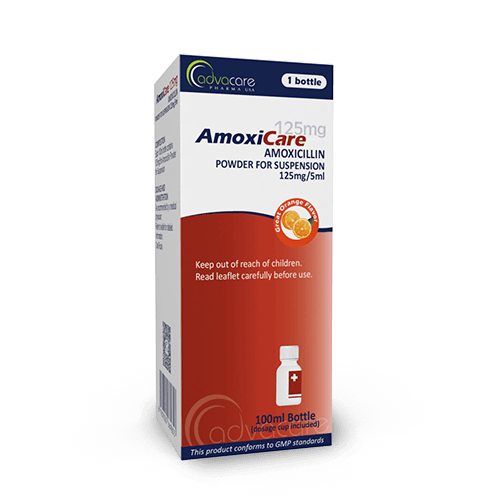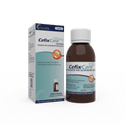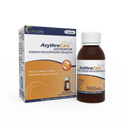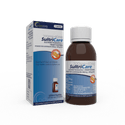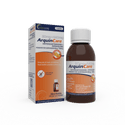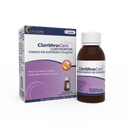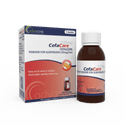- Home›
- Pharmaceuticals›
- Pharmaceutical Suspensions›
- Powder for Suspension›
- Amoxicillin for Oral Suspension
Amoxicillin for Oral Suspension
Dosage
Packaging
What is Amoxicillin?
Active Ingredients: Amoxicillin
Amoxicillin for Oral Suspension is a penicillin antibiotic drug used to treat different types of infections, such as ear infections, bladder infections, pneumonia, gonorrhea, and dental abscesses. This medication is typically a first-choice antibiotic because it is better absorbed than other beta-lactam antibiotics.
To avoid the development of drug-resistant bacteria and maintain the effectiveness of Amoxicillin and other antibacterial drugs, this drug should only be used to treat infections that are proven or strongly suspected to be caused by bacteria. Amoxicillin is also sometimes used together with other antibiotics to treat some types of infections.
Amoxicillin (also known as amoxycillin) is a moderate-spectrum, beta-lactam antibiotic used to treat bacterial infections caused by susceptible microorganisms. It works by killing bacteria, which prevents growth. This medicine will not work for viral infections.
The full prescribed course of Amoxicillin must be completed, even if symptoms improve before the medication is finished. Stopping the antibiotic early can lead to the development of resistant bacteria, making subsequent infections harder to treat.
Amoxicillin is generally well-tolerated, but like all antibiotics, it can cause side effects in some patients. Common side effects include nausea, vomiting, diarrhea, and allergic reactions ranging from mild skin rashes to severe anaphylaxis. The use of Amoxicillin, particularly over a prolonged period, may lead to an overgrowth of non-susceptible organisms, including fungi, necessitating additional treatment.
Amoxicillin for Oral Suspension is often preferred for its ease of administration, especially in children who may have difficulty swallowing pills. Shake the bottle well before each use to ensure the medication is evenly distributed.
AdvaCare Pharma is a GMP-certified global supplier of Amoxicillin for Oral Suspension. We offer a wide range of high-quality and cost-effective medical supplies that are available for distribution. These medications are produced in our facilities in China, India, and the USA.
Why are we a quality Amoxicillin manufacturer?
AdvaCare Pharma, a GMP-compliant pharmaceutical company, specializes in the manufacture of Amoxicillin for Suspension. Our strategic manufacturing locations and innovative management systems ensure full control over the supply chain, resulting in enhanced quality standards and decreased costs throughout the production, transport and import processes. As a trusted Amoxicillin manufacturer, we globally supply a comprehensive range of 55+ oral liquid medicines in suspension dosage form to more than 65 countries.
Uses
What is Amoxicillin used for?
It is used to treat some types of bacterial infections, such as:
- tonsillitis
- bronchitis
- pneumonia
- gonorrhea
- urinary tract infections
How is Amoxicillin for Oral Suspension used?
This medication is manufactured as a powder, which must be mixed in water before oral consumption.
After reconstitution, it is best to refrigerate (between 2°C and 8°C) the suspension to ensure its potency. It should remain stable for up to 14 days in ideal conditions. Before use, the dry powder should be stored in a cool and dry environment.
What dose should be given?
For general bacterial infections, the usual dose for adults is 250-500mg, taken orally every 8-12 hours.
For children over 3 months old, the usual dose is 25-45mg/kg per day, divided and given every 12 hours. The maximum dosage is 875mg in a single dose.
For children under 3 months old, the usual dose is 20-30mg/kg per day, divided and given every 12 hours.
Refer to a doctor or pharmacist for guidelines on dosage. The dosage is based on medical condition, response to the treatment, age, and weight.
How does Amoxicillin Oral Suspension work against bacteria?
Amoxicillin works by inhibiting the synthesis of bacterial cell walls, which is essential for their survival. This leads to the weakening and eventual rupture of the cell wall, causing the bacteria to die. It is effective against a range of gram-positive and gram-negative bacteria.
Is Amoxicillin Oral Suspension suitable for all age groups?
Amoxicillin can be used in patients of all ages, including infants, children, and the elderly. Dosage adjustments are necessary based on age, weight, and renal function.
Can Amoxicillin Oral Suspension be used to treat viral infections?
Amoxicillin is ineffective against viral infections like the common cold or flu. Its use should be limited to bacterial infections to prevent the development of antibiotic resistance.
How does Amoxicillin Oral Suspension interact with other antibiotics?
Amoxicillin can be used in combination with other antibiotics like clarithromycin and metronidazole to treat certain types of infections. Its combination with other antibiotics should be based on the recommendation of a healthcare provider.
Is it necessary to complete the entire course of Amoxicillin Oral Suspension?
Yes; completing the full course of Amoxicillin as prescribed is necessary, even if symptoms improve before the medication is finished. Stopping the antibiotic early can lead to the development of resistant bacteria.
Can Amoxicillin Oral Suspension affect the results of laboratory tests?
Amoxicillin can affect the results of some laboratory tests, including urine glucose tests and blood typing. Patients should inform the laboratory personnel and their doctors that they are using Amoxicillin before undergoing any tests.
How should patients take Amoxicillin if they have a history of allergies?
Patients with a history of allergic reactions to penicillin or other beta-lactam antibiotics should inform their healthcare provider before taking Amoxicillin. Alternative antibiotics may then be recommended.
Can Amoxicillin Oral Suspension be used during pregnancy?
Amoxicillin is generally considered safe for use during pregnancy, but it should be used only when clearly needed. As with any medication during pregnancy, the potential benefits must be weighed against the risks.
Is Amoxicillin Oral Suspension safe for breastfeeding mothers?
Amoxicillin is excreted in breast milk in small amounts. It is generally considered safe for use by breastfeeding mothers, but there is a potential for sensitization or allergic reactions in the nursing infant. A physician must be consulted before using.
Is it safe to take Amoxicillin Oral Suspension with alcohol?
While alcohol does not directly interact with this drug, avoid or limit alcohol consumption while taking any antibiotic, including Amoxicillin. Alcohol can impair immune function and hydration, potentially affecting the body's ability to fight infection.
Can Amoxicillin Oral Suspension be used in patients with renal impairment?
In patients with renal impairment, the dosage of Amoxicillin may need to be adjusted. Reduced kidney function can lead to a slower elimination of the medication from the body, potentially increasing the risk of side effects.
What should be done if a dose of Amoxicillin Oral Suspension is missed?
If a dose of Amoxicillin is missed, it should be taken as soon as remembered. However, if it is nearly time for the next scheduled dose, the missed dose should be skipped to avoid doubling up.
How does food affect the absorption of Amoxicillin Oral Suspension?
The absorption of Amoxicillin Oral Suspension is not significantly affected by food, meaning it can be taken with or without meals. In some cases, taking Amoxicillin with food may help reduce gastrointestinal side effects like nausea or stomach upset in some patients.
Does Amoxicillin Oral Suspension require special storage conditions?
Before reconstitution, Amoxicillin powder should be stored in a cool, dry place. Once reconstituted, the suspension should be refrigerated and used within 14 days. It should not be frozen.
Side Effects
As with all pharmaceuticals, some unwanted effects can occur from the use of Amoxicillin for Oral Suspension.
Common side effects include, but may not be limited to:
- nausea
- rash
- diarrhea
- vomiting
- mild rash
Seek medical attention if the following develop:
- dark urine
- persistent nausea or vomiting
- confusion
- anxiety
- insomnia
- sensitivity to light and sounds
- flu-like symptoms
- difficulty breathing
For a comprehensive understanding of all potential side effects, consult a medical professional.
If the common side effects occur while taking Amoxicillin for Oral Suspension, these are typically mild and may resolve as the body adjusts to the medication.
For mild rashes, over-the-counter antihistamines can be used, but if the rash worsens or is accompanied by other symptoms like fever or difficulty breathing, medical attention should be sought immediately.
Precautions
Do NOT use Amoxicillin for Oral Suspension if:
- You are allergic to amoxicillin, cephalosporins, or any other penicillin antibiotic.
- You have asthma, liver or kidney disease, a bleeding clotting disorder, or mononucleosis.
- You are taking a tetracycline antibiotic.
Possible interactions with Amoxicillin include methotrexate. Amoxicillin can reduce the renal excretion of methotrexate, leading to higher levels of methotrexate in the blood. Elevated levels of methotrexate may enhance its toxic effects, particularly on the kidneys and bone marrow.
This medication may lower the effectiveness of hormonal birth control, so a secondary method of birth control, such as condoms, should be used during the course of treatment and for a short period after finishing Amoxicillin to ensure continued prevention of unintended pregnancy.
For a comprehensive list of the medicines that may interact with amoxicillin, talk to a doctor, pharmacist, or healthcare specialist.
Alcohol should not be consumed while undergoing treatment with Amoxicillin, as this medication can increase the risk of side effects, such as stomach upset, dizziness, and impaired judgment, and can potentially hinder the body's ability to fight the infection effectively.
The use of Amoxicillin during pregnancy and breastfeeding does not appear to be harmful. Consult a doctor or healthcare professional before treatment.
It should be noted that Amoxicillin may also alter the results of some laboratory tests.
References
Efficacy of Amoxicillin Treatment in Preventing Postoperative Complications in Patients Undergoing Third Molar Surgery: A Prospective, Randomized, Double-Blind Controlled Study
The primary goal of this research was to assess and compare the incidence of postoperative complications in patients undergoing third molar surgery while being treated with amoxicillin.
This study was a randomized, double-blind, placebo-controlled clinical trial involving 123 patients. Participants were divided into three groups: preoperative amoxicillin treatment, postoperative amoxicillin treatment, and placebo treatment. Several factors were assessed during the trial, including wound infection, pain, temperature, trismus, dysphagia, intra- and extraoral swelling, and overall postoperative complications. Both surgeons and patients were blinded to the treatment assignments.
The results indicated no significant differences in the incidence of pain, trismus, wound infections, temperature, or dysphagia among the groups. Patients receiving postoperative amoxicillin treatment showed better outcomes compared to those receiving prophylactic (preoperative) treatment.
The conclusion is that amoxicillin is an effective antibiotic for preventing complications in patients undergoing surgical treatment, with the best results observed when the antibiotic is administered postoperatively.

You might be interested in...
Why AdvaCare Pharma?
As an industry leader, we are aware of our responsibility to provide affordable and sustainable solutions to improve healthcare worldwide.
